| Srl | Item |
| 1 |
ID:
111621
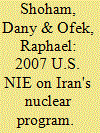

|
|
|
| 2 |
ID:
097144
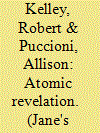

|
|
|
| 3 |
ID:
126318
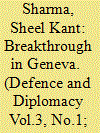

|
|
|
|
|
| Publication |
2013.
|
| Summary/Abstract |
It is just 10 days since Iran its interlocutors reached an interim deal in Geneva and its implementation has commenced with the announcement of a visit by the international Atomic Energy Agency (IAEA) to the heavy water reactor project at Arak. The interim deal is about a temporary freeze, as a first step, in the progress of diverse aspect of the Iranian nuclear program but is of considerable significance even as a first step. This is because of the agreed links in the initial steps, with marginal softening of sanctions and the promise of no more of them. The deal also lays down in a comprehensive package the goal of negotiations and a process towards that goal which has been on the card of many months. An linking of the progress was felt when Iran and the IAEA accepted a work plan on November 11, 2013, to resolve outstanding issues. The subsequent negotiations in Geneva among the foreign Ministers of Iran and the P-5 plus Germany till the wee hours of November 24, 2013, were hard and intensive. Foreign Minister Zarif tweeted on the conclusion these negotiations that "there is white smoke".
|
|
|
|
|
|
|
|
|
|
|
|
|
|
|
|
| 4 |
ID:
131263
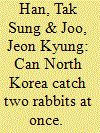

|
|
|
| 5 |
ID:
170722
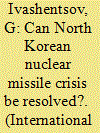

|
|
|
| 6 |
ID:
091462
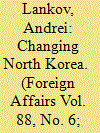

|
|
|
|
|
| Publication |
2009.
|
| Summary/Abstract |
By exposing them to the truth about their impoverishment and about the prosperity of their South Korean cousins, the United States can encourage North Koreans to change the regime in Pyongyang.
|
|
|
|
|
|
|
|
|
|
|
|
|
|
|
|
| 7 |
ID:
100624
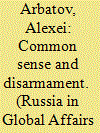

|
|
|
| 8 |
ID:
094365
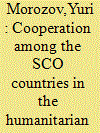

|
|
|
| 9 |
ID:
160986
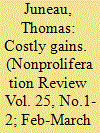

|
|
|
|
|
| Summary/Abstract |
Iran’s nuclear ambitions have been at the center of Middle Eastern politics and a global nonproliferation source of concern for almost twenty years. Much has been written on the topic, but one important question has received less attention: was it beneficial for the Islamic Republic? How have the gains and losses associated with its nuclear pursuits compared with each other? This article attempts to provide a comprehensive assessment of the costs and benefits of Iran’s nuclear program. We start with an overview of the literature on why states pursue nuclear programs. This allows us to build a list of objectives that states can hope to achieve through their nuclear ambitions. We use these as yardsticks to assess the gains Iran has reaped and the losses it has incurred. This leads to the conclusion that, although Iran has earned some benefits from its nuclear program, these have been costly; ultimately, the costs have exceeded the benefits. We conclude by reflecting on what the Iranian case tells us more broadly about the study of nuclear proliferation.
|
|
|
|
|
|
|
|
|
|
|
|
|
|
|
|
| 10 |
ID:
115804
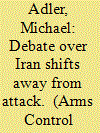

|
|
|
| 11 |
ID:
113614


|
|
|
|
|
| Publication |
2012.
|
| Summary/Abstract |
New works give us glimpses into North Korea, yet little of this translates to how the government frames issues or sees the outside world. In particular, we know little about Pyongyang's nuclear ambitions. This paper proposes data mining using automated content analysis-computer software to analyzes text-to track trends in North Korean rhetoric. Using daily news reports from the Korean Central News Agency (KCNA) for 2010 provides an empirical basis for making claims on how Pyongyang attempts to frame nuclear issues. This paper suggests that North Korea largely identifies nuclear issues with the United States in contrast to the other parties in the Six Party talks. Furthermore, references to nuclear issues, as well as to Kim Jong Un, are remarkably absent during the two major military actions of 2010 (the Cheonan sinking and the shelling of Yeonpyeong island).
|
|
|
|
|
|
|
|
|
|
|
|
|
|
|
|
| 12 |
ID:
094511
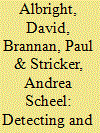

|
|
|
| 13 |
ID:
107582
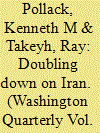

|
|
|
| 14 |
ID:
147684


|
|
|
|
|
| Summary/Abstract |
Libya proved to be a unique example of WMD elimination. Unlike other WMD elimination cases, which arose out of an armed conflict that resulted in an opportunity to access and destroy a WMD program, Libya began as a cooperative WMD elimination effort that took a turn after violence erupted. The first phases of elimination arose from a combination of diplomacy, economic sanctions, and fears by the Libyan government of possible military action. This phase effectively reversed Muammar Qaddafi's attempt to develop a nuclear program and prevented the Libyan government from having access to chemical weapons when the “Arab Spring” reached Libya. The ensuing civil war brought new challenges to elimination: a breakdown in security, increased risk of chemical-weapons proliferation to violent extremists, and the discovery of a previously unknown stockpile of filled chemical munitions. Following Qaddafi's death, the second phase restarted the chemical-weapons elimination and presented new challenges still. These included the need for rapid action to complete the destruction, negotiating with an interim government, and assisting destruction without US personnel on the ground in Libya.
|
|
|
|
|
|
|
|
|
|
|
|
|
|
|
|
| 15 |
ID:
156929


|
|
|
|
|
| Summary/Abstract |
This article analyzes how foreign policy is made in the Islamic Republic of Iran. To do so, it analyzes the role of various state institutions, factions, and individuals in the formulation and conduct of foreign policy. Actual powers of various institutions in Iran have evolved greatly since 1979. The history and causes of such institutional changes are discussed briefly. Iran is not a one-man dictatorship. Rather, it is ruled by an oligarchy comprised of fundamentalist Shia clerics and lay fundamentalists. The ruling elite is composed of competing factions such as hard-liners, expedients, and reformists, as well as sub-factions such as pragmatic hard-liners and ultra-hard-liners. The oligarchy is deeply divided on many issues, including on foreign policy. This article presents, in great detail, the views and policy proposals of the top members of the oligarchy regarding Iran's nuclear program, relations with the U.S., and Iran's regional policies. Finally, this article applies the findings of this research to the case of Iran's nuclear program. Evidence shows that Iran has had a clandestine nuclear weapons program. This article analyzes the ruling oligarchy's responses to the global reaction to Iran's nuclear program.
|
|
|
|
|
|
|
|
|
|
|
|
|
|
|
|
| 16 |
ID:
122129
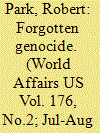

|
|
|
|
|
| Publication |
2013.
|
| Summary/Abstract |
North Korea's nuclear weapons test on February 12th was its third and most powerful to date. According to the Democratic People's Republic of Korea's state-controlled news agency, the test was carried out "using a miniaturized and lighter nuclear device with greater explosive force than previously." It was a wake-up call for some in the arms control community who have dismissed Pyongyang's nuclearization merely as a bargaining chip for monetary or material concessions and against regime change. The North Koreans are now playing in the big leagues, with a warhead small enough to be used on an intercontinental ballistic missile that, according to the regime, could potentially strike not only US bases in South Korea and Japan, but also Guam and the US mainland. Those who ritualistically condemned the test also ignored one of the issues that it was meant to obscure: while spending billions on its nuclear program, the Kim regime, in continuity with its dynastic predecessors, was also presiding over a state-induced famine and mass atrocities within its prison camp system that have taken on the proportions of a homemade genocide.
|
|
|
|
|
|
|
|
|
|
|
|
|
|
|
|
| 17 |
ID:
115579
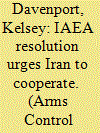

|
|
|
| 18 |
ID:
093703


|
|
|
|
|
| Publication |
2010.
|
| Summary/Abstract |
THERE IS a global consensus that any agreement with Iran on ensuring its nuclear program is for civilian purposes only will have to involve inspections to verify its disarmament. But as a former weapons inspector, I have very bad news for you: a weapons-inspection regime in Iran will not work. Inspections themselves are most effective when both the state being inspected and the inspecting countries are fully on board-and even then there are limits. An inspection regime can never ensure full disarmament. We can only hope it would detect major violations.
|
|
|
|
|
|
|
|
|
|
|
|
|
|
|
|
| 19 |
ID:
087075
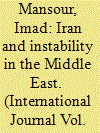

|
|
|
|
|
| Publication |
2008.
|
| Summary/Abstract |
In the Middle East today, Iran is trying to upgrade its status to a dominant power by demonstrating an ability to penetrate and influence various regional theatres. Meanwhile, despite being the sole global power with considerable military presence in the region, America's strategic initiatives in the Middle East are frustrated by Iran's behaviour.
|
|
|
|
|
|
|
|
|
|
|
|
|
|
|
|
| 20 |
ID:
082018
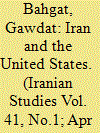

|
|
|
|
|
| Publication |
2008.
|
| Summary/Abstract |
Hostility between Iran and the United States has intensified since the mid-2000s. America's allegations regarding Iran's nuclear program and its association with terrorist organizations are the main drive for this rising tension. This study focuses on the latter. Specifically, it examines Tehran's ties to militant groups in Iraq, Hezbollah in Lebanon, and Hamas in the Palestinian Territories. I argue that although American and Iranian interests in the region are very different, they are not necessarily mutually exclusive.
|
|
|
|
|
|
|
|
|
|
|
|
|
|
|
|